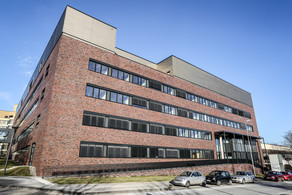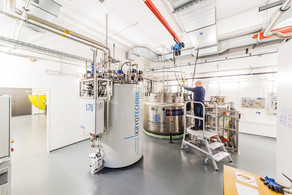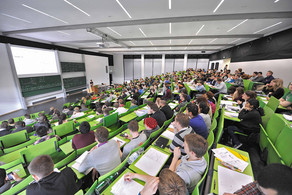Research Focus: Accelerator Physics
The research focus of accelerator physics includes, among other things, the operation and further development of the 1.5 GeV electron storage ring DELTA at the Center for Synchrotron Radiation, a central scientific facility of TU Dortmund University. Worldwide, only a few large-scale facilities of this kind are operated by a university. Special magnetic structures, so-called undulators as well as a superconducting wiggler, generate intense radiation from the terahertz to the X-ray range. This synchrotron light is used by research groups at TU Dortmund University and other universities and research institutions for the non-destructive investigation of a wide variety of condensed matter structures.
Accelerator research has achieved spectacular successes in recent years, e.g. free-electron lasers in the X-ray range, a new generation of synchrotron radiation sources with special properties, the further development of superconducting technologies, and laser plasma acceleration with extremely high electric fields.
With its emphasis on research and education, DELTA is particularly well suited to develop and test new methods of particle beam diagnosis and manipulation. One example is the use of femtosecond laser pulses to generate ultrashort radiation pulses in storage rings and to improve the beam properties of free-electron lasers. Another example is the application of artificial intelligence methods to optimize accelerator parameters better and faster than with traditional techniques.
Since the construction of DELTA under the leadership of Prof. Dr. Klaus Wille in the 1990s, numerous accelerator physicists have been trained at TU Dortmund who are now working at various Helmholtz centers and other research facilities in Germany and abroad.
Contact
For all matters concerning the research focus as a whole, especially in matters of research and teaching, please contact:












